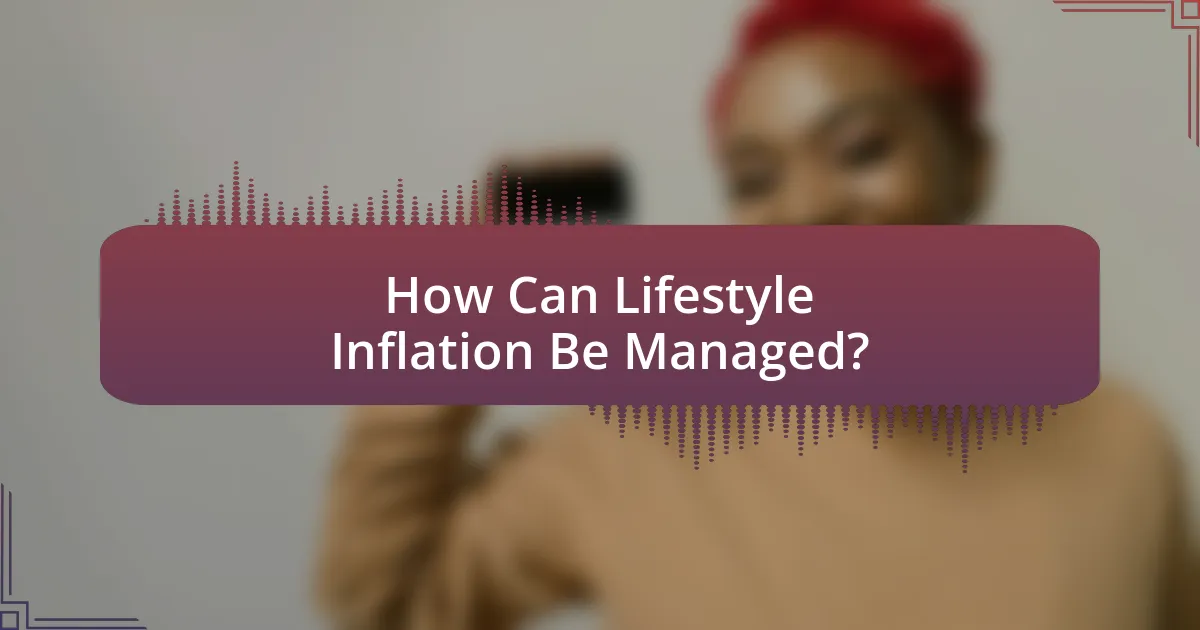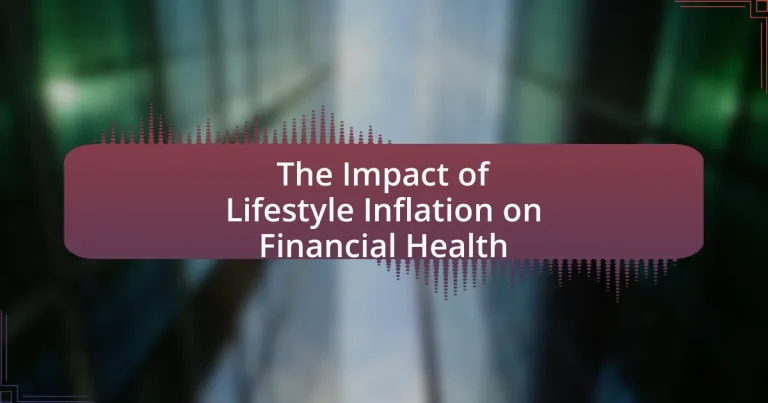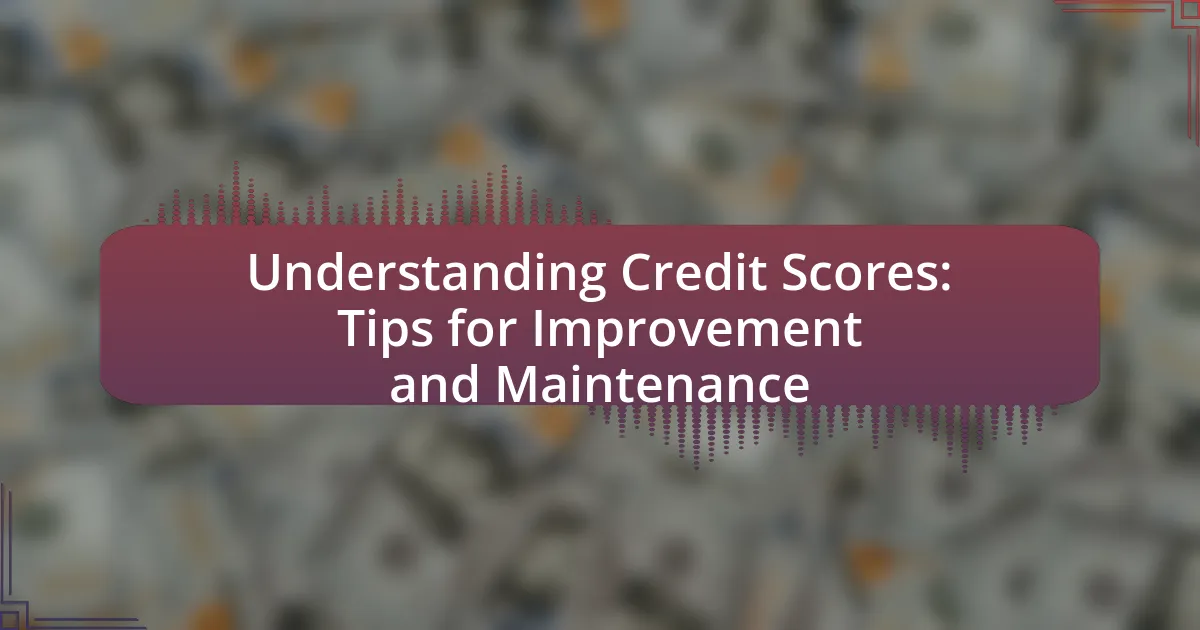Lifestyle inflation is the phenomenon where individuals increase their spending as their income rises, often leading to reduced savings and increased debt levels. This article examines the causes and triggers of lifestyle inflation, including social comparison and psychological factors, and highlights its negative impact on financial health, such as hindering wealth accumulation and retirement planning. It also discusses practical strategies for managing lifestyle inflation, including budgeting, setting financial goals, and prioritizing needs over wants, emphasizing the importance of financial education in fostering long-term financial stability.

What is Lifestyle Inflation and How Does it Affect Financial Health?
Lifestyle inflation refers to the tendency of individuals to increase their spending as their income rises, often leading to a higher standard of living. This phenomenon can negatively affect financial health by reducing savings rates and increasing debt levels, as individuals may prioritize luxury items and experiences over financial stability. Research indicates that individuals who experience lifestyle inflation may find it challenging to build wealth, as they allocate a larger portion of their income to discretionary spending rather than investments or savings. For example, a study by the National Endowment for Financial Education found that many Americans struggle to save adequately due to increased spending habits linked to income growth.
Why do people experience lifestyle inflation?
People experience lifestyle inflation because as their income increases, they tend to increase their spending on non-essential items and services. This behavior is often driven by social comparison, where individuals feel pressure to match the consumption levels of peers or societal standards. Research indicates that approximately 60% of individuals with rising incomes report increased spending on luxury goods and services, which contributes to a cycle of higher expenses and diminished savings. Additionally, psychological factors such as the desire for status and the belief that higher spending equates to greater happiness further exacerbate lifestyle inflation.
What triggers lifestyle inflation in individuals?
Lifestyle inflation in individuals is primarily triggered by an increase in income, leading to a corresponding rise in spending on non-essential goods and services. As individuals earn more, they often feel compelled to upgrade their lifestyle, such as moving to a more expensive home, purchasing luxury items, or dining out more frequently. Research indicates that this phenomenon can be exacerbated by social influences, where individuals compare their spending habits to those of peers, resulting in a desire to maintain or enhance their social status. A study published in the Journal of Economic Behavior & Organization highlights that individuals who experience income increases are more likely to increase their consumption levels, thereby reinforcing the cycle of lifestyle inflation.
How does lifestyle inflation relate to income increases?
Lifestyle inflation occurs when individuals increase their spending as their income rises, leading to a higher cost of living. This phenomenon often results in a cycle where increased income does not translate into greater savings or financial security, as individuals tend to adopt more expensive habits and lifestyles. Research indicates that approximately 60% of individuals experience lifestyle inflation, which can hinder long-term financial goals and savings rates.
What are the potential consequences of lifestyle inflation?
Lifestyle inflation can lead to significant financial consequences, including increased debt levels and reduced savings. As individuals increase their spending in response to rising income, they often prioritize luxury items over essential savings, which can result in a lack of financial security. According to a study by the National Endowment for Financial Education, nearly 70% of Americans live paycheck to paycheck, indicating that lifestyle inflation contributes to financial instability. Additionally, lifestyle inflation can hinder long-term wealth accumulation, as funds that could be invested or saved are instead allocated to non-essential expenditures. This pattern can perpetuate a cycle of financial stress and limit future opportunities for financial growth.
How does lifestyle inflation impact savings and investments?
Lifestyle inflation negatively impacts savings and investments by increasing expenses as income rises, leading to reduced savings rates. When individuals experience lifestyle inflation, they often allocate more of their income to discretionary spending rather than saving or investing. For instance, a study by the Bureau of Labor Statistics shows that as income increases, consumer spending on non-essential items tends to rise disproportionately, which can result in a savings rate decline. This behavior can hinder long-term financial growth, as less capital is available for investments that could yield returns over time.
What role does lifestyle inflation play in debt accumulation?
Lifestyle inflation significantly contributes to debt accumulation by encouraging individuals to increase their spending as their income rises. When people experience a boost in earnings, they often feel compelled to upgrade their lifestyle, such as purchasing larger homes, luxury cars, or expensive vacations, rather than saving or investing the additional income. This shift in spending habits can lead to living beyond one’s means, resulting in reliance on credit and ultimately increasing debt levels. Research indicates that individuals who do not manage lifestyle inflation effectively can find themselves in precarious financial situations, as their expenses grow faster than their income, leading to a higher likelihood of accumulating debt.

How Can Lifestyle Inflation Be Managed?
Lifestyle inflation can be managed by creating a budget that prioritizes savings and investments over increased spending. Establishing clear financial goals helps individuals resist the temptation to upgrade their lifestyle with every income increase. Research indicates that individuals who allocate at least 20% of their income to savings are more likely to maintain financial stability despite lifestyle changes. Additionally, practicing mindful spending and distinguishing between wants and needs can further mitigate lifestyle inflation, allowing individuals to enjoy their earnings without compromising their financial health.
What strategies can help mitigate lifestyle inflation?
To mitigate lifestyle inflation, individuals should adopt a proactive budgeting strategy that prioritizes savings and investments over increased spending. By setting clear financial goals and adhering to a budget, individuals can resist the temptation to elevate their spending in line with income increases. Research indicates that maintaining a savings rate of at least 20% of income can significantly enhance long-term financial stability, as highlighted by the National Endowment for Financial Education. Additionally, practicing mindful spending by evaluating needs versus wants can further curb unnecessary expenses, reinforcing a disciplined financial approach.
How can budgeting prevent lifestyle inflation?
Budgeting can prevent lifestyle inflation by establishing clear financial limits that prioritize savings and essential expenses over discretionary spending. When individuals create and adhere to a budget, they gain awareness of their income and expenditures, allowing them to allocate funds effectively. This structured approach helps individuals resist the temptation to increase their spending as their income rises, thereby maintaining their standard of living without inflating their lifestyle. Research indicates that individuals who budget are more likely to save consistently, which can counteract the effects of lifestyle inflation by ensuring that increased income is directed towards long-term financial goals rather than immediate consumption.
What is the importance of setting financial goals in managing lifestyle inflation?
Setting financial goals is crucial in managing lifestyle inflation because it provides a clear framework for prioritizing spending and saving. By establishing specific, measurable, achievable, relevant, and time-bound (SMART) financial goals, individuals can create a budget that aligns with their long-term financial objectives, thereby preventing unnecessary increases in their standard of living. Research indicates that individuals with defined financial goals are more likely to save effectively and resist the temptation to overspend on non-essential items, which is a common consequence of lifestyle inflation. For instance, a study published in the Journal of Financial Planning found that goal-oriented individuals saved 20% more than those without clear financial objectives, demonstrating the effectiveness of goal-setting in curbing lifestyle inflation.
How does awareness of lifestyle inflation influence financial decisions?
Awareness of lifestyle inflation significantly influences financial decisions by prompting individuals to prioritize savings and investments over unnecessary expenditures. When people recognize that increased income often leads to higher spending on non-essential items, they are more likely to adopt a frugal mindset, thereby allocating funds towards long-term financial goals such as retirement savings or debt repayment. Research from the National Endowment for Financial Education indicates that individuals who actively monitor their spending habits are 30% more likely to save effectively, demonstrating a direct correlation between awareness of lifestyle inflation and improved financial decision-making.
What mindset shifts are necessary to combat lifestyle inflation?
To combat lifestyle inflation, individuals must adopt a mindset focused on valuing long-term financial stability over short-term gratification. This shift involves prioritizing savings and investments rather than immediate consumption, which can lead to unsustainable spending habits. Research indicates that individuals who consciously limit their lifestyle upgrades after income increases tend to maintain better financial health, as they avoid the trap of continuously raising their spending to match their earnings. For instance, a study by the National Endowment for Financial Education found that individuals who practice mindful spending and prioritize financial goals are more likely to achieve financial security and independence.
How can tracking expenses help in understanding lifestyle inflation?
Tracking expenses provides clear visibility into spending patterns, which is essential for understanding lifestyle inflation. By meticulously recording expenditures, individuals can identify trends where their spending increases disproportionately to their income, indicating lifestyle inflation. For instance, a study by the Bureau of Labor Statistics shows that consumer spending on luxury items often rises as income increases, highlighting a direct correlation between income growth and increased discretionary spending. This awareness allows individuals to make informed financial decisions, potentially curbing unnecessary expenses and maintaining a balanced budget.

What are the Long-term Effects of Lifestyle Inflation on Financial Health?
Lifestyle inflation negatively impacts long-term financial health by increasing expenses without a corresponding increase in savings or investments. As individuals elevate their spending in line with income growth, they often forgo opportunities to build wealth, leading to a cycle of dependency on higher income levels. Research indicates that individuals who experience lifestyle inflation may save significantly less; for instance, a study by the Employee Benefit Research Institute found that only 50% of workers save adequately for retirement, often due to increased living costs associated with lifestyle inflation. This trend can result in insufficient retirement funds, increased debt levels, and financial instability over time.
How does lifestyle inflation affect retirement planning?
Lifestyle inflation negatively impacts retirement planning by increasing current spending, which reduces the amount saved for retirement. As individuals experience income growth, they often elevate their lifestyle expenses, leading to a decrease in savings rates. According to a study by the Employee Benefit Research Institute, individuals who allow lifestyle inflation to dictate their spending habits can end up saving significantly less, potentially jeopardizing their financial security in retirement. This trend emphasizes the importance of maintaining a consistent savings strategy, regardless of income increases, to ensure adequate retirement funds.
What are the risks of lifestyle inflation on future financial security?
Lifestyle inflation poses significant risks to future financial security by increasing fixed expenses and reducing savings potential. As individuals increase their spending in response to higher income, they often prioritize luxury items and lifestyle upgrades over long-term financial goals. This shift can lead to inadequate savings for emergencies, retirement, or investments, ultimately jeopardizing financial stability. Research indicates that individuals who experience lifestyle inflation may save less than 10% of their income, compared to those who maintain a frugal lifestyle, who can save upwards of 20%. Consequently, the inability to save adequately can result in financial vulnerability during economic downturns or unexpected life events.
How can lifestyle inflation hinder wealth accumulation over time?
Lifestyle inflation hinders wealth accumulation over time by increasing expenses as income rises, leading to reduced savings and investment potential. When individuals experience a salary increase, they often elevate their standard of living by purchasing luxury items or upgrading their lifestyle instead of saving or investing the additional income. According to a study by the Bureau of Labor Statistics, consumer spending increases significantly with income, which can result in a stagnant savings rate. This pattern prevents individuals from building a substantial financial cushion or growing their wealth through investments, ultimately impacting long-term financial health.
What practical steps can individuals take to avoid lifestyle inflation?
Individuals can avoid lifestyle inflation by establishing a strict budget and adhering to it. Creating a budget allows individuals to track their income and expenses, ensuring that they prioritize savings and investments over unnecessary spending. Additionally, individuals should set clear financial goals, such as saving a specific percentage of their income each month, which helps maintain focus on long-term financial health rather than short-term desires.
Another effective step is to practice mindful spending by evaluating the necessity of each purchase, which can prevent impulse buys that contribute to lifestyle inflation. Research indicates that individuals who regularly review their financial situation and adjust their spending habits accordingly are more likely to maintain financial stability. Furthermore, individuals can benefit from automating savings, directing a portion of their income into savings or investment accounts before they have the chance to spend it, thereby reinforcing a habit of saving over spending.
By implementing these strategies, individuals can effectively manage their finances and mitigate the risks associated with lifestyle inflation.
How can prioritizing needs over wants help in financial health?
Prioritizing needs over wants significantly enhances financial health by ensuring essential expenses are met before discretionary spending occurs. This approach helps individuals allocate their resources effectively, reducing the likelihood of debt accumulation and fostering savings. For instance, a study by the National Endowment for Financial Education found that individuals who budgeted primarily for needs reported higher savings rates and lower financial stress. By focusing on necessities, individuals can create a stable financial foundation, allowing for better long-term planning and investment opportunities.
What role does financial education play in preventing lifestyle inflation?
Financial education plays a crucial role in preventing lifestyle inflation by equipping individuals with the knowledge and skills to manage their finances effectively. This education helps individuals understand the importance of budgeting, saving, and investing, which can counteract the tendency to increase spending as income rises. Research indicates that individuals with financial literacy are more likely to prioritize long-term financial goals over short-term desires, thereby reducing the likelihood of lifestyle inflation. For instance, a study by the National Endowment for Financial Education found that individuals who received financial education were 20% more likely to save and invest their income rather than spend it on non-essential items.





